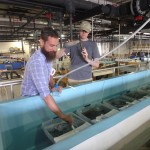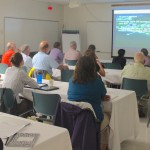Much of what is going under as the sea advances is material that was deposited as previous ice sheets melted. The Cape May Formation, the major geologic formation along the bay, was deposited during previous interglacial periods as rivers ran to the sea. Much of the Cape May Delta was created by a larger ancestral Great Egg Harbor River. Melting ice created land that now is threatened by higher seas… Underneath Sandy Hook, we found 270 feet of sediments deposited since 20,000 years ago,” said Kenneth Miller, a marine geologist at Rutgers University.
Fisheries/Aquaculture
Last Call: Tackling Terrorism, a Social Security Fight, Taxes and the GOP
In another sign the planet’s in trouble, NASA and the National Oceanographic and Atmospheric Administration announced that last year was the planet’s warmest since record-keeping began in 1880, and last month scientists recorded the highest average December temperatures — ever. Obama’s made climate change a centerpiece of his second term, but the GOP majority in Congress is packed with climate change skeptics in key places… “Anyone that has ever kept a fish tank knows that if you crank up your aquarium heater and dump acid into the water, your fish are in trouble. This is what climate change is doing now to the oceans,” study co-author Malin Pinsky, an ecologist at Rutgers University, said in a statement.
Ocean life faces mass extinction, broad study says
A team of scientists, in a groundbreaking analysis of data from hundreds of sources, has concluded that humans are on the verge of causing unprecedented damage to the oceans and the animals living in them… “We’re lucky in many ways,” said Malin L. Pinsky, a marine biologist at Rutgers University and another author of the new report. “The impacts are accelerating, but they’re not so bad we can’t reverse them.” Scientific assessments of the oceans’ health are dogged by uncertainty: It’s much harder for researchers to judge the well-being of a species living underwater, over thousands of miles, than to track the health of a species on land.
Study: Climate change affecting fish movement
According to a study being conducted by Rutgers University, climate change seems to be pushing several species of fish and crustaceans northward along the east and west coasts of North America. The movement could have serious effects on birds, marine mammals and those who depend on fishing for food and income. “As temperatures have warmed in the waters off our coasts, animals with a low tolerance for that warming have just picked up and shifted,” says Malin Pinsky, a marine biologist at Rutgers who is leading a team researching these shifts.
Adapting to Shifts in Marine Species Due to Climate Change Research Available on New Website
During the past 18 months, Assistant Professor of Ecology and Evolution Malin Pinsky has published two papers documenting and exploring the implications of the trend of marine species shifting to cooler waters as a result of climate change. He and his team have found that the shift northward is happening at different rates among the […]
Climate change driving fish north, Rutgers research shows
What fishermen have seen for years has now been confirmed- and mapped – by a group of Rutgers researchers, that warmer ocean waters have caused fish to seek their ideal temperatures farther north… Last week, the Rutgers team released data and charts to the public showing more than 60 species and how they migrated over the last 40 years. The average drift northward is 0.7 of a degree latitude, and 15 meters deeper in the water, Pinsky’s work found. “We’re seeing a trend of many species shifting northward and shifting deeper,” said Malin Pinsky, a marine biologist leading the Rutgers team. “It is a sea change – and it affects fisheries quite a bit.”
Undergraduate Wins American Fisheries Society’s Best Poster Award
SEBS student Collin Dobson (Marine Sciences ’15), an intern at the Haskin Shellfish Research Laboratory, won the Best Poster award at the Mid-Atlantic Chapter of the American Fisheries Society annual meeting in Lewes, DE, on Nov. 8. Dobson’s poster, titled “Waved Whelk (Buccinum undatum) in the Mid-Atlantic Bight: Biology of Commercial Catch and Population Distribution,” […]
Student Interns Tackle Oyster Disease Ecology at Haskin Lab
Ecologically diverse communities are resilient communities. But can this diversity also help prevent the spread of disease? This question was at the heart of research conducted during experiments conducted by student interns at the Haskin Shellfish Research Laboratory in Bivalve, New Jersey. As part of a collaborative project with Old Dominion University, that is funded […]
Collaborative Workshop Promotes Science-Based Approach to Manage Shellfish Diseases
Researchers at the Virginia Institute of Marine Science (VIMS) and the Rutgers Haskin Shellfish Research Laboratory (HSRL) joined with scientific colleagues, shellfish farmers, and government officials in October to explore options for improving management of oyster and clam diseases along the East Coast of the U.S., in light of the region’s rapidly growing aquaculture industry. […]
The Oyster is Her World
A School of Environmental and Biological Sciences Honors Program scholar, senior Lauren Huey, is on a mission to save the Delaware Bay’s oyster population from a fatal disease. Read more on the Rutgers University–New Brunswick website.






